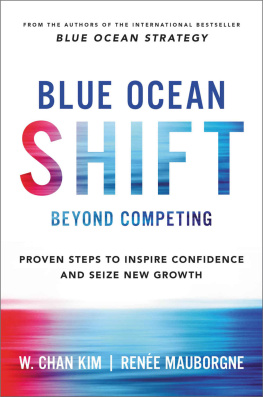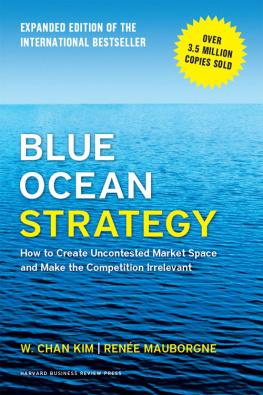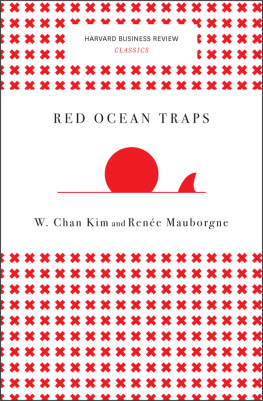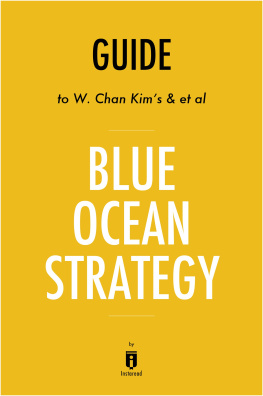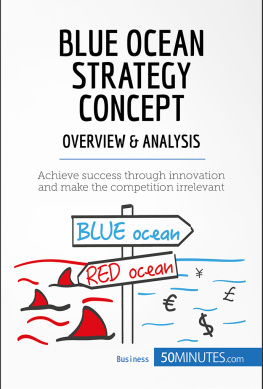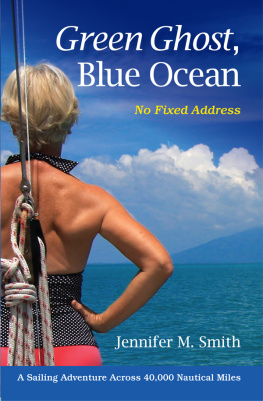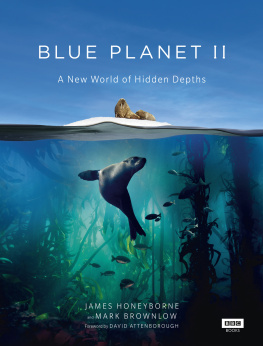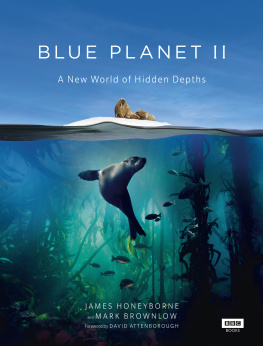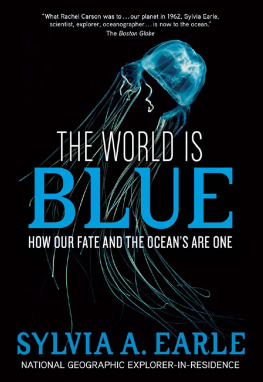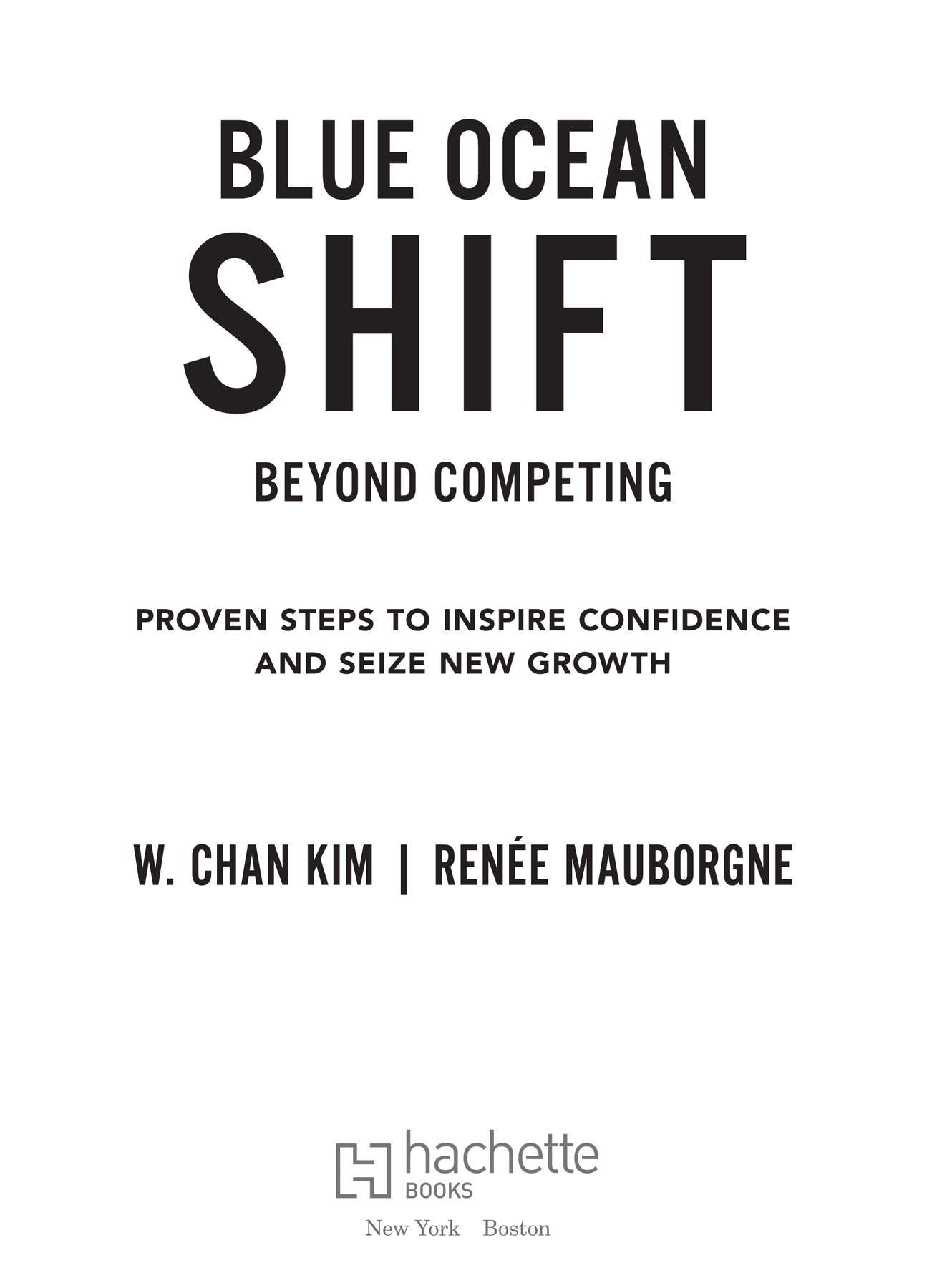Copyright 2017 by W. Chan Kim and Rene Mauborgne
Cover copyright 2017 by Hachette Book Group, Inc.
Hachette Book Group supports the right to free expression and the value of copyright. The purpose of copyright is to encourage writers and artists to produce the creative works that enrich our culture.
The scanning, uploading, and distribution of this book without permission is a theft of the authors intellectual property. If you would like permission to use material from the book (other than for review purposes), please contact permissions@hbgusa.com. Thank you for your support of the authors rights.
Hachette Books is a division of Hachette Book Group, Inc.
The Hachette Books name and logo are trademarks of Hachette Book Group, Inc.
The publisher is not responsible for websites (or their content) that are not owned by the publisher.
The Hachette Speakers Bureau provides a wide range of authors for speaking events. To find out more, go to www.hachettespeakersbureau.com or call (866) 376-6591.
ISBNs: 978-0-316-31404-6 (hardcover), 978-0-316-31405-3 (ebook), 978-0- 316-39679-0 (large print)
In the poem O Me! O Life! Walt Whitman, the American poet and essayist, reflects on the trials and tribulations that define the human experience. What good amid these, O me! O life? he asks. His answerthat all of us, individually and collectively, may contribute a verse to the powerful play that is lifehas never left us.
Life has its challenges and tribulations, no doubt. But it is not beyond our ability to shape. By our very existence, we all are able to contribute a verse and, in doing so, influence lifes course, and maybe even its beauty, if only by an inch.
What will your verse be? What will ours? We have never stopped asking ourselves this question. What do we want to stand for? What narrative arc do we want to focus our efforts on in the hopes of adding a small verse to the powerful play that is life that can help our world to advance?
For us, as business scholars, the world we aspired to help advance wasnt one defined by competing and dividing up markets or the globe, where ones gain comes at the expense of others. Competition exists, and win-lose scenarios abound, but they werent what captured our imaginations, nor what we believed our world needed more of. What we admired, what inspired us, were the organizations and individuals that went beyond competing to create new frontiers of opportunity, growth, and jobs, where success was not about dividing up an existing, often shrinking pie, but about creating a larger economic pie for allwhat we refer to as blue oceans. Blue oceans are less about disruption and more about nondisruptive creation, where ones gain doesnt have to come at the expense of others.
But how do you translate aspiration into action, intention into reality?
We need a road map that can shift our perspective and free our imaginations, allowing us to suspend belief in the limits of today so we can see and create the possibilities of tomorrow. And for that we need to inspire confidence in ourselves and in our people because, although we all are replete with creative energy and resilience, at our core, most of us are also incredibly tender and vulnerable. Without the confidence to act, few will venture down a new path, no matter how clear the road map. We aspire to make a difference, yet at the same time fear we cannot. Confidence is that magical quality that allows us to transcend the quiet self-doubts that tug at us. It shows us the emotional way forward by allowing us to believe in ourselves and trust the process.
The book you are holding in your hands is our answer to this challenge. It is based on our nearly 30-year research journey to the blue ocean in which we studied organizations large and small, for-profit, nonprofit, and governments that moved beyond competing in existing crowded marketswhat we think of as red oceansto new heights of confidence, market creation, and growth. What we learned in studying those who succeeded in making this shift as well as those who failed is that for any process to work, it must acknowledge our doubts and build our confidence as much as unlock peoples requisite creativity with proven steps.
In Blue Ocean Shift, people and our human spirit are put on an equal plane with a tested process and market-creating tools to move you, your team, and your organization from red to blue oceans in a way that people own and drive the process to succeed. It provides a step-by-step guide anyone can follow with battle-tested lessons learned from the field on what works, what doesnt, and how to avoid potential pitfalls along the way.
We made our choice of what verse we want to bring to the world. We firmly believe that we all are capable of creating new frontiers and verses of our own. As Nelson Mandela once noted, It always seems impossible until its done. We hope that this book can help you make yours.
W HEN I PLAY MUSIC, I feel like Im in a beautiful world that is endless.
In 2008, amid the devastation that is Iraqa country of religious and ethnic divisions, hardship, and warZuhal Sultan had a dream. The 17-year-old Iraqi pianist wanted to create her countrys first national youth orchestra and travel with it abroad. Iraq, however, had few formally trained musicians or music teachers, and few quality instruments to speak of, not to mention cultural chasms dating back centuries that divided Iraqi youth.
Where to begin? Using the Internet, Zuhal reached out to find a conductor. Paul MacAlindin, a Scottish conductor and classically trained musician, responded and signed on to lead the National Youth Orchestra of Iraq (NYOI).
It didnt take Paul long to see that he would need to be a strategist as well as a musician, since the orchestra would have no chance if it competed on the same terms as other national youth orchestras. The industry was intensely competitive, dominated by venerable European youth orchestras from countries such as France, Italy, Spain, and the UK. Comprised of highly trained young musicians with great technical skills, these orchestras engaged world-class guest soloists and conductors, and featured polished performances of classical masterpieces by composers such as Brahms, Beethoven, and Mahler. To stand apart, while keeping costs low, Paul realized that NYOI would have to break with industry tradition and redefine what it meant to be a national youth orchestra.
Rather than focus on technical excellence and musical sophistication, NYOI would focus on the power of music to heal, bridge the deepest divides, and showcase the hidden glory of Iraqs rich heritage. To this end, Paul reduced the orchestras reliance on musical excellence and a sophisticated European repertoire, and eliminated renowned guest soloists and guest conductors, which dramatically dropped its cost structure.
In its place, Paul and Zuhal assembled a group of youthful musicians who would play original Iraqi music of both Kurdish and Arab origin and put it on an equal footing with the likes of Haydn, Beethoven, and Schubert, which they also played. Much to the disbelief of many, NYOI brought together young men and women musicians who were Sunni and Shia, Arab and Kurdish. In this way, Paul and Zuhal built an orchestra that demonstrated the young Iraqis hope and commitment to building a brighter future together out of the destruction of war. As NYOI member Mohammed Adnan Abdallah put it, Music is the language of peace, and it makes people love each other. When musicians sit and play together, they communicate that.

